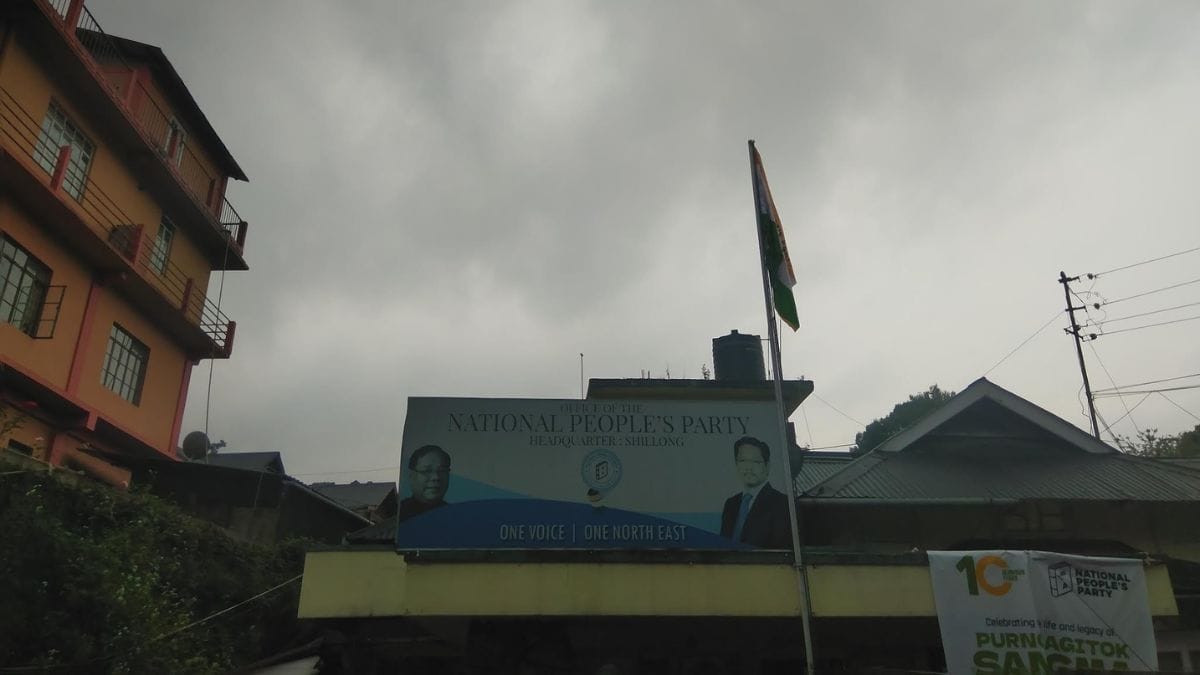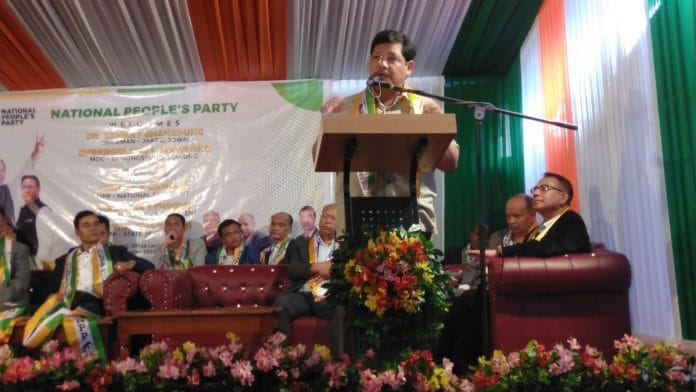Shillong: Back in 2013, when former Lok Sabha speaker Purno Agitok Sangma founded the National People’s Party (NPP) in Meghalaya — formally taking over a Manipur-based party — it was with the ambition of setting up a tribal-centric national party. Nine years on, his son, Meghalaya Chief Minister Conrad Sangma, remains relentless in his efforts to expand the party beyond Meghalaya and the Northeast.
In August this year, during the NPP’s national executive meeting in Delhi, Conrad, the party president, sounded the poll bugle for next year’s assembly elections in Meghalaya, Tripura and Nagaland.
NPP leaders in Meghalaya also told ThePrint last week that the party plans to contest in the Karnataka assembly election next year.
“Right now the focus is on Meghalaya and Nagaland… We are looking to put the NPP on the Tripura map,” said Nicky Nongkhlaw, president of the National People’s Youth Front, the NPP’s youth wing. He added, “In Karnataka, too, we will be contesting in a few seats.”
Other leaders from the party, too, spoke about the NPP’s optimism about expanding its footprint in the country.
“Nobody can stop us from moving to other parts of the country; we are eventually aiming to have strong, substantial representation in Delhi,” said Wanweiroy Kharlukhi, a Rajya Sabha MP and the NPP’s Meghalaya president.
The party’s focus, he added, will be on tribal seats.
In the 2018 assembly election in Meghalaya, the NPP had won 19 of the 60 seats. (The count increased to 23 following bypolls in 2018, 2019 and 2021.) Despite the Congress having won 21 seats, the NPP managed to clinch power after forming an alliance with the Bharatiya Janata Party (BJP) and other parties.
Meanwhile, in the 2018 assembly election in Nagaland, the NPP won two seats.
While Meghalaya and Nagaland are still familiar ground after two consecutive elections, the party’s plans to make inroads into Tripura and Karnataka could prove too ambitious, according to experts ThePrint spoke to. This is the first time the party is fighting in Tripura and the second time in Karnataka, where it had failed to win a single seat in the 2013 election.
On its home turf Meghalaya, the changing political scenario, including the entry of the Trinamool Congress (TMC), frayed relations with the BJP in the state and allegations of corruption, is likely to lead to a different outcome for the party.
Also read: National People’s Party to fight Meghalaya polls alone, not with BJP, says Conrad Sangma
Expansion plans
The NPP will be contesting several seats in next year’s assembly elections in both Tripura and Karnataka, said party leaders.
“We have formed a committee and we will be contesting in 20-25 constituencies in Nagaland and Tripura, both in next year’s elections. People have joined from other parties,” said NPP MLA from Manipur Rameshwar Singh, who is in charge of Manipur and Nagaland.
Singh added: “The NPP has been present in Tripura for the past four months. There is a good gap because of the political developments here [no single party has been able to emerge as a strong opposition]… and we are a party that is mainly looking for the development of people.”
Despite the clamour over the TMC throwing its hat in the ring for the 2023 polls in Tripura, the party has failed to emerge as a strong contender. In the bypolls held in June, the TMC had lost in all four seats.
When asked if the focus in Tripura would be on fighting tribal seats (which are 20 of the 60 seats in the state), Nongkhlaw said, “The first and foremost thing for us is tribals. We are there with the regional concept to stand for the rights and benefits of tribals.”
Meanwhile, in Karnataka, the party is considering contesting in 50-100 of the state’s 224 assembly seats.
Prabhu Bosco, the general secretary of the Karnataka NPP, said that the party would also consider contesting in the Bruhat Bengaluru Mahanagara Palike (BBMP) polls. “We are focusing on youngsters and first-time voters… We have identified several youth leaders,” he said. The party will also be focusing on reserved category seats, he added.
According to Bosco, 50 per cent of the tickets in Karnataka will be given to female candidates. The NPP in the state has been rallying under the slogan ‘My vote is not for sale’.
When asked how “a party from the Northeast” would be received by voters in Karnataka, Bosco said, “This is a national party like the Congress and the BJP.”
For all his confidence, though, the NPP had fielded 21 candidates in Karnataka in the 2013 elections, but didn’t manage to win a single seat. “It will take 10 years to emerge as a formidable force in Karnataka… but we are getting a good response now,” said Bosco.
‘Too ambitious’
Political experts ThePrint spoke to felt the NPP could be biting off more than it can chew.
“They can contest the elections, but winning will be a difficult task. At the same time, they haven’t been able to keep people on. In Manipur and Arunachal Pradesh, we have seen people joining and leaving,” said Dr Moses Kharbithai, assistant professor in department of political science at Assam University.
Kharbithai gave the example of when the NPP had fought and won four seats in the 2013 Rajasthan elections. He said, “They had won because of the leaders and not the party. In the next elections, the leaders dumped the party.”
According to Batskhem Myrboh, an assistant professor of political science at the Shillong-based Synod College, the fight in Tripura especially could look to be difficult.
“They will have to fight a national party like the BJP, and in the tribal areas TIPRA Motha (the Pradyot Deb Barma-led Tripura Indigenous Progressive Regional Alliance), which will be difficult to penetrate,” he said.
He added, “Since they won some seats in Manipur (2022 elections) they are going all out…They have their headquarters in Delhi, but they are still seen as a party from Meghalaya.”
In other states in the Northeast, including Manipur and Arunachal Pradesh, the party is yet to win more than 10 seats.
In Manipur, the party managed to improve its tally in the 2022 assembly polls only by three seats, despite contesting in around 40 seats. It won seven of the total 60 seats.
In Arunachal Pradesh, the NPP had managed to win five seats in the 2019 assembly polls — it currently holds four due to the death of MLA Tirong Aboh — and formed a post-poll alliance with the ruling BJP.
Changing scenario on home ground
Meanwhile, with the Meghalaya assembly session in full swing, it was a quiet scene at the NPP office in Shillong — a single-storeyed yellow building in the city’s Lachumiere areas — when ThePrint visited on 8 September.
“Everything will pick up after the session, we are expecting some legislators to join,” a party office bearer told ThePrint. “There have been quite a few supporters of the Congress coming, including MLAs and booth-level presidents”.

The NPP has set its eyes on contesting on its own in all 60 assebly seats, and has even zeroed in on candidates, said sources in the party. They added that the coming few months will also see at least three Congress legislators, who are expected to contest the polls, join the NPP.
According to the sources, one of these legislators will be Ampareen Lyngdoh, a former state cabinet minister and the current Congress MLA from East Shillong.
Back in February, Lyngdoh and the remaining four Congress MLAs in the state pledged their support to the NPP-led ruling coalition in yet another blow to their party, which had last year lost 12 of its 17 MLAs to the TMC.
The five leaders — Lyngdoh, Mohendro Rapsang, Mayralborn Syiem, Kimfa Sidney Marbaniang, and P.T. Sawkmie — were suspended by the party for supporting the MDA (Meghalaya Democratic Alliance, a coalition of the NPP, BJP and other parties) which is BJP backed, following which Lyngdoh had said that the legislators now had no option but to look elsewhere.
The decline of the Congress, which had won the greatest number of seats in the 2018 assembly polls, has been advantageous for the NPP and the United Democratic Party (UDP), experts have said.
“The Congress has had a strong support base in the state, which is waning, and now the NPP and UDP, especially in the Khasi hills, stand to benefit. People here vote for leaders, not parties,” said Myrboh.
Meanwhile, Nongkhlaw told ThePrint, “We want to expand, but first of all our own home should be tight; we are looking to get a majority this time.”
The party is, however, pitted against several challenges.
The ‘corruption factor’ & other challenges
In the past several months, the Conrad Sangma-led government has also faced mounting criticism over alleged corruption and scams.
Last month, the TMC alleged a multi-crore rupees scam in the Shillong smart city project in Meghalaya. The opposition party in the state had also hit out at the NPP for “large-scale corruption” in the power sector.
BJP MLA A.L. Hek cited “corruption” as a reason, and said this had pushed his party to consider exiting the alliance.
“When B.L. Santhosh [BJP national general secretary] came recently, it was discussed during the meeting that we will withdraw from the MDA,” Hek said and added, “We decided this because there is a lot of corruption in the MDA government.”
The CM has responded to these allegations, saying, “We are very clear on our stand that whatever we have done, we have been doing as per procedures as per law and everything has been done in a proper, clean and transparent manner.”
Myrboh, however, said that a perception of “bad governance” may not affect how people vote, and pointed out that factors like ethnic ties and money power tend to be more significant.
The bigger challenge, according to political experts, may be the CM’s supposed lack of connection with the grassroots. This could especially dent the party’s chances in the Garo Hills, where his home constituency is located.
A retired government officer from Tura, district headquarters of the West Garo Hills, told ThePrint, “Conrad hasn’t been able to connect to the people here (Garo Hills)…the TMC led by Mukul Sangma will do much better.”
“Conrad Sangma is media friendly, but people on the ground don’t know him. This is unlike Purno Sangma, whose journey as a leader spanned almost three decades,” Kharbithai said.
Myrboh agreed, but highlighted that the NPP in the past few years had still managed to break the perception of being a “Garo party”.
“When Purno Sangma was in the Nationalist Congress Party (before the NPP was formed), they couldn’t make any inroads in the Khasi-Jaintia hills, but the NPP has been able to break the perception that it is a Garo party,” he said.
Of the 60 seats in the Meghalaya assembly, 29 are in the Khasi Hills, seven in the Jaintia Hills, and 24 in the Garo Hills. The past three chief ministers of the state have all come from the Garo hills.
(Edited by Poulomi Banerjee)
Also read: Brothel raid on Meghalaya BJP vice-chief strains ties with NPP 6 months before polls






